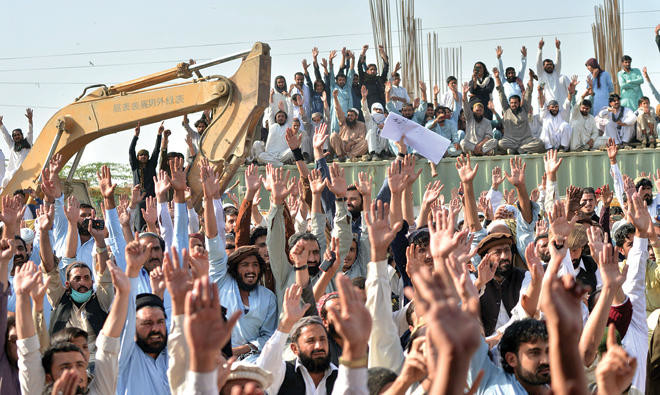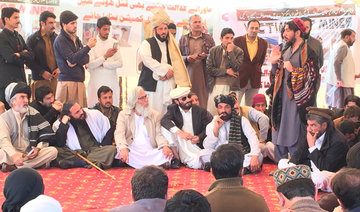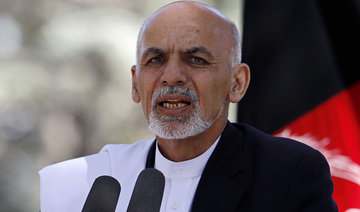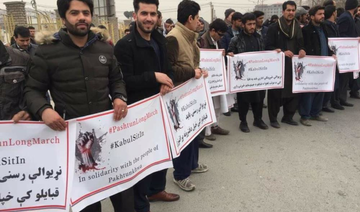ISLAMABAD/KABUL: Pakistan’s tribesmen, who have been protesting since Feb. 1 to seek justice for Naqeebullah Mehsud, have formally announced they will call off their sit-in after the government assured them in writing it will fulfil their demands within a month.
Prime Minister Shahid Khaqan Abbasi has accepted two out of five demands put forth by the tribesmen including the arrest and bringing the accused Rao Anwar to justice as soon as possible, and clearance of land mines from the Federally Administered Tribal Areas (FATA).
The PM has, however, apparently not acknowledged three demands that included an end of what they have described as extrajudicial killings of tribal people in Karachi and other parts of the country; recovery of all missing tribal people and presenting them in court; and ending curfews in tribal areas after any untoward incident.
“Genuine grievances raised by jirga members from different quarters would also be addressed as soon as possible,” the prime minister assured the tribesmen in the written promise.
Rao Anwar, who is accused in the killing of 27-year-old aspiring model Mehsud in a staged encounter in Karachi last month, is still at large despite a suo moto notice by the Supreme Court.
“We are ending our sit-in, but we have given a one-month deadline to the authorities and if, during this period our demands are not met, we will come again,” protest organizer Noor Rehman told Arab News.
Addressing protesters outside the National Press Club this evening, the prime minister’s adviser on political affairs, Amir Muqam, said that India and other countries have been propagandizing against Pakistan due to the sit-in; therefore, it immediately should be called off.
The chief spokesman of Afghan President Ashraf Ghani on Saturday said that he hopes the protest by group of tribesmen in Islamabad will turn into a “civil move” against extremism which has become an obstacle against development because the region has fallen victim to terrorism.
“The world, media, and civil society need to back this historical move,” Shah Hussein Murtazawi told Arab News.
Afghan President Ashraf Ghani on Friday voiced his support in favor of the protest in Pakistan by ethnic Pashtuns.
A social media savvy group of young Pashtuns organized a sit-in in Islamabad, creating the hashtag #PashtunLongMarch.
“I fully support the historical #PashtunLongMarch in Pakistan. The main purpose of which is to mobilize citizens against fundamentalism and terrorism in the region,” Ghani said in a tweet.
“I hope #PashtunLongMarch will also succeed in uprooting and eradicating terrorism from their region. The historical importance of this march traces back to the great proponent of non-violence, Bacha Khan, whose philosophy was based on a non-violent ideology,” he added.
Khan was a national hero of the Pashtuns and pushed for the reunion of millions of people of the ethnic group, separated by British colonialists from ancient Afghanistan under a deal with a former Afghan ruler.
Ghani urged the media to help the protesters present their demands, calling the march as “a wake-up call against fundamentalism.”
Pakistani tribesmen, who were holding the long march to seek justice for Naqeebullah Mehsud, found Ghani’s statement uncalled for.
“We are patriotic Pakistanis and cannot allow anyone to interfere in our internal issues,” Mehmood Khan Mehsud, a tribal elder who is supporting the protest, told Arab News.
“The Afghan president should try to put his own house in order by cracking down against militants instead of poking his nose in Pakistan’s internal affairs,” he suggested.
He said their protest was apolitical and they were just struggling to get justice for Mehsud.
“Ashraf Ghani has tried to incite the tribal people against our government and we condemn it with one voice,” said another tribal leader Samiullah Burki.
“We have rendered invaluable sacrifices in the war against terrorism and continue to do so to make Pakistan a peaceful and prosperous country,” he said.
Pakistani tribesmen call off sit-in, reject Ghani’s support of their protest
Pakistani tribesmen call off sit-in, reject Ghani’s support of their protest

US hit by first extreme heat wave of the year

- Heat records tumbled across parts of the US Northeast, including in Central Park, known as the lungs of Manhattan, where Monday’s temperature of 96 degrees broke a record that had stood since 1888, according to the National Weather Service
NEW YORK: A potentially life-threatening heat wave enveloped the eastern third of the United States on Monday impacting nearly 160 million people, with temperatures expected to climb to 104 degrees Fahrenheit (40 degrees Celsius) in the New York metropolitan area.
The country’s first significant scorching heat of the year arrived over the weekend and peaks Monday and Tuesday in Washington, Baltimore, Philadelphia and New York City.
“This extreme heat will not just be uncomfortable and oppressive for New Yorkers,” warned Mayor Eric Adams, adding that each year heat claims the lives of 500 people in this city of eight million.
“It’s going to be brutal and dangerous if you do not treat it with the understanding that we want you to,” he added.
As sweltering heat enveloped the city, authorities urged seniors, people with health problems and those without air conditioning to stay hydrated and seek help at designated cooling centers such as libraries and recreation facilities.
Heat records tumbled across parts of the US Northeast, including in Central Park, known as the lungs of Manhattan, where Monday’s temperature of 96 degrees broke a record that had stood since 1888, according to the National Weather Service.
“Extreme Heat Warnings and Heat Adviseries across much of the eastern third of the country (are) affecting nearly 160 million people” across at least 29 states, the NWS reported.
“This level of HeatRisk is known for being rare and/or long duration with little to no overnight relief, and affects anyone without effective cooling and/or adequate hydration,” the agency warned.
Meteorologists are describing the intensifying weather pattern as a heat dome, a high-pressure system that traps air and leads to steadily rising thermal readings.
For many in the Big Apple, avoiding work in the searing heat was not an option.
“We have to endure it, because otherwise what are we going to survive on?” Manuel, a manual worker repairing a building facade in New York’s Harlem neighborhood, told AFP.
“Sometimes we stop because it’s a danger. We don’t all have the same energy, but you have to endure,” he added.
In the Washington Heights neighborhood, authorities opened several fire hydrants so residents could seek relief with the gushing water.
One of the local heroes was Ronald Marcelin, a 44-year-old air conditioning technician sweating profusely as he repaired a pizzeria’s AC unit.
“I’m taking the heat so that everyone else can cool down,” Marcelin said with a grin.
The soaring temperatures come just as New Yorkers head to the polls Tuesday for the Democratic primary that will decide the party’s mayoral candidate. This promises to be a tight race between Andrew Cuomo, who is seeking political resurrection after resigning in disgrace as state governor in 2021, and rising left-wing star Zohran Mamdami.
Over the weekend, Cuomo urged residents to cast their votes even if the temperatures hit 100 degrees Fahrenheit.
In Washington, the heat index — what the temperature feels like with humidity factored in — was forecast to soar to as high as 110 F on Monday, and the mayor’s office urged residents to take advantage of cooling centers.
Scientists say extreme heat waves are a clear sign of global warming, and they are expected to become more frequent, longer, and more intense.
Fueled by human-caused climate change, 2024 was the warmest year on record globally — and 2025 is projected to rank among the top three.
EU will not yield decision-making right in US tariff talks, says von der Leyen

- Her comments come amid speculation that Washington may be pressing Brussels into delaying the implementation of laws such as those on deforestation and online platforms or providing exemptions to US companies
BRUSSELS: The European Union will not give up its right to make policy decisions in negotiations with the United States to avert higher US tariffs on EU goods, European Commission President Ursula von der Leyen said on Monday.
“Of course, we discuss tariff lines, we discuss non-tariff barriers, like standards and norms. For example, we discuss strategic purchases, we discuss all these topics,” von der Leyen told a news conference after an EU-Canada summit.
“But where it is the sovereign decision-making process in the European Union and its member states that is affected, this is too far,” she continued, adding this was an “untouchable.”
Her comments come amid speculation that Washington may be pressing Brussels into delaying the implementation of laws such as those on deforestation and online platforms or providing exemptions to US companies.
Philippine Vice President Sara Duterte seeks dismissal of impeachment case

- The House of Representatives impeached Duterte in early February on charges of graft, corruption and an alleged assassination plot against one-time ally and former running mate President Ferdinand Marcos Jr
MANILA: Philippine Vice President Sara Duterte responded Monday to her Senate impeachment trial summons, demanding the case against her be dropped.
The House of Representatives impeached Duterte in early February on charges of graft, corruption and an alleged assassination plot against one-time ally and former running mate President Ferdinand Marcos Jr.
A guilty verdict in the Senate would result in her removal from office and permanent disqualification from politics.
A copy of Duterte’s reply to the summons delivered by messenger to House prosecutors on Monday afternoon called the complaint against her an abuse of the impeachment process.
“There are no statements of ultimate facts in the (impeachment complaint). Stripped of its ‘factual’ and legal conclusions, it is nothing more than a scrap of paper,” the response read.
It goes on to deny the allegations made against her as “false” and state that the Senate’s decision to remand the case to the House earlier this month removed her responsibility to answer them.
Duterte is currently on a trip to Australia where she is meeting with Filipino supporters.
Her summons was issued on June 10 after an hours-long Senate session that saw lawmakers convene as an impeachment court only to send the case back to the House, a decision one lawmaker called a “functional dismissal.”
Bangladesh detains Hasina era ex-election chief

- KM Nurul Huda is accused of rigging past polls in favor of former leader
DHAKA: A Bangladesh court on Monday remanded in custody the former elections chief for his alleged role in rigging the vote in favor of now-ousted autocrat Sheikh Hasina.
KM Nurul Huda, 77, was ordered to be detained for four days while questioning continues, a day after a mob who smashed into his home and assaulted him eventually handed him to the police.
On Sunday, the powerful Bangladesh Nationalist Party filed a case against Huda and other former election commissioners it accuses of rigging past polls in favor of Hasina, whose 15 years in power ended in an mass uprising in August 2024.
Interim leader Mohammed Yunus has said elections will be held in early April 2026 — the first in the South Asian nation of around 170 million people since the student-led revolt ousted Hasina.
Police put a helmet on Huda while taking him to the court for protection.
Yunus’s government warned last month that political power struggles risked jeopardizing gains that have been made, saying that holding elections by mid-2026 would give them time to overhaul democratic institutions.
Hasina’s rule saw widespread human rights abuses and her government was accused of politicizing courts and the civil service, as well as staging lopsided elections.
Hasina, 77, remains in self-imposed exile in India, where she fled after she was ousted last year.
She has defied orders to return to Dhaka to face charges amounting to crimes against humanity. Her trial in absentia continues.
UK and Ukraine agree to deepen ties as Zelensky meets Starmer

- Zelensky met with Starmer at his Downing Street home, after earlier visiting King Charles III at Windsor Castle
- The trip comes on the eve of a NATO summit in The Hague, which Zelensky is due to attend
LONDON: Seeking to shore up support more than three years into Russia’s invasion, Ukrainian President Volodymyr Zelensky met UK Prime Minister Keir Starmer during a surprise visit to London on Monday, cementing a military co-production deal.
Zelensky met with Starmer at his Downing Street home, after earlier visiting King Charles III at Windsor Castle.
The trip comes on the eve of a NATO summit in The Hague, which Zelensky is due to attend.
Addressing Ukrainian military personnel undergoing training in the UK, Starmer said the pair had had “an excellent bilateral meeting” and agreed on an “industrial military co-production agreement,” which he called “a massive step forward in the contribution that we can continue to make.”
Zelensky, speaking beside Starmer, insisted the deal “will be very strong and will transform both nations,” although no details were released.
After the meeting, Starmer said it was “really a privilege, a pleasure” to welcome Zelensky, calling him “a regular now at Downing Street.”
Starmer told the Ukrainian troops it was “really humbling” to see their “level of professionalism, commitment and bravery.”
More than 50,000 troops have now been trained as part of the international partnership.
Zelensky said the scheme had helped “strengthen our army” and enabled Ukraine to “survive and fight.”
The UK has been one of Ukraine’s staunchest supporters since Russia invaded in early 2022, levelling rounds of sanctions against Moscow and supplying multiple packages of military aid.
Starmer promised the support would continue “for the rest of the conflict” and help put Ukraine in “the strongest possible position” to negotiate a ceasefire.
Zelensky said his country was “very thankful to the UK... for such big support of Ukraine from the very beginning of this war.”
The Ukrainian leader earlier traveled to Windsor Castle, where he “visited The King... and remained to luncheon,” Buckingham Palace said.
Zelensky is expected at the NATO summit in The Hague on Tuesday and Wednesday, where Ukraine’s allies will work “to ensure that Ukraine is in the best possible position as we go into the next stage of this conflict,” according to Starmer.
NATO allies are poised to take a “quantum leap” by hiking defense spending to counter the threat of Russia, Secretary General Mark Rutte said on the eve of the two-day summit.
The alliance’s 32 members will pledge to boost defense expenditure to five percent of gross domestic product, a key demand of President Donald Trump, who has long grumbled that the US pays too much for NATO.
NATO’s members have thrashed out a compromise deal to dedicate at least 3.5 percent of GDP to core military needs by 2035, and 1.5 percent to broader security-related items like cyber-security and infrastructure.
“The defense investment plan that allies will agree in The Hague introduces a new baseline, five percent of GDP to be invested in defense,” Rutte told reporters at a pre-summit news conference.
“This is a quantum leap that is ambitious, historic and fundamental to securing our future.”





















